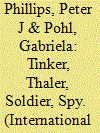| Srl | Item |
| 1 |
ID:
089492


|
|
|
|
|
| Publication |
2009.
|
| Summary/Abstract |
In this paper, terrorism is analysed using the tools of modern portfolio theory. This approach permits the analysis of the returns that a terrorist group can expect from their activities as well as the risk they face. The analysis sheds new light on the nature of the terrorist group's (attack method) choice set and the efficiency properties of that set. If terrorist groups are, on average, more risk averse, the economist can expect the terrorist group to exhibit a bias towards bombing and armed attack. In addition, even the riskiest (from the terrorist group's point of view) combinations of attack methods have maximum expected returns of less than 70 injuries and fatalities per attack per year.
|
|
|
|
|
|
|
|
|
|
|
|
|
|
|
|
| 2 |
ID:
177899


|
|
|
|
|
| Summary/Abstract |
The use of artificial intelligence (AI) and algorithms by intelligence agencies requires the capability to counter their use by rival agencies. A formal-technical development of this capability can be assisted by decision theory, including behavioural economics. Peter J Phillips and Gabriela Pohl argue that decision theory provides a useful framework that can be used to think about thinking. It is a catalogue of things that human decision-makers can consult when considering their own decision-making processes or those of adversaries and friends. Such a catalogue may be relevant during the development of AI and counter-AI capability in an intelligence setting.
|
|
|
|
|
|
|
|
|
|
|
|
|
|
|
|
| 3 |
ID:
069852


|
|
|
| 4 |
ID:
182556


|
|
|
|
|
| Summary/Abstract |
The use and exploration of outer space is, according to the Outer Space Treaty (OST), to be carried out for the benefit and interest of all parties. Outer space is critically important to the defence and national security interests of many nations, none more so than the United States. Over time, a significant space junk problem has emerged. There is growing recognition of this problem and reason to believe that it will only get worse if current activities continue. Space junk presents a threat to the national security interests and economic interests of spacefaring nations. Various solutions are being proposed and developed. This paper presents an economic perspective and, in a particular, a behavioural economics perspective, on the space junk and national security problem. As various potential technological solutions emerge, we are interested in the obstacles that may stand in the way of an optimal prioritisation of the alternatives.
|
|
|
|
|
|
|
|
|
|
|
|
|
|
|
|
| 5 |
ID:
168383


|
|
|
|
|
| Summary/Abstract |
The large number of names on terrorism watch lists raises the problem of monitoring. Given the existing resource constraints and other logistical considerations, efficient and accurate ranking of individuals in terms of threat posed is of paramount importance. This process, however, may be impacted by reference points, diminishing sensitivity, loss aversion, and other aspects of the human decision-making process that introduce biases. This article explores the relevance of decision-making processes and biases to the specific task of ranking and monitoring individuals whose names have been placed on a terrorism watch list.
|
|
|
|
|
|
|
|
|
|
|
|
|
|
|
|
| 6 |
ID:
151707


|
|
|
|
|
| Summary/Abstract |
The paper explores terrorist choice by applying two well-known theoretical frameworks: stochastic dominance and prospect theory (PT). We analyse each pair of attack methods that can be formed from the RAND-MIPT database and the Global Terrorism Database. Instances of stochastic dominance are identified. PT orderings are computed. Attention is accorded to the identification of ‘trigger points’ and the circumstances that may lead to an increased likelihood that a terrorist will select an attack method associated with a higher expected number of fatalities, i.e. a potentially more damaging attack method.
|
|
|
|
|
|
|
|
|
|
|
|
|
|
|
|
| 7 |
ID:
179138


|
|
|
|
|
| Summary/Abstract |
Behavioral economics, or “economics and psychology,” is an attempt to extend the explanatory power of economics by developing economic theory on more plausible psychological foundations.1 Most of its findings and applications pertain to decisionmaking under conditions of risk and uncertainty. There are two parts of the intelligence process to which an understanding of behavioral economics may be relevant: (1) the transactions and exchanges involved in agent recruitment and agent running, and (2) the task of prioritizing human intelligence (HUMINT) sources for interrogation. More generally, any prioritization task involving ranking or ordering is shaped systematically by the human decisionmaking process.
|
|
|
|
|
|
|
|
|
|
|
|
|
|
|
|